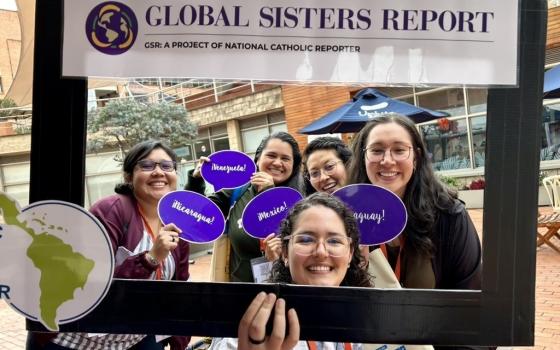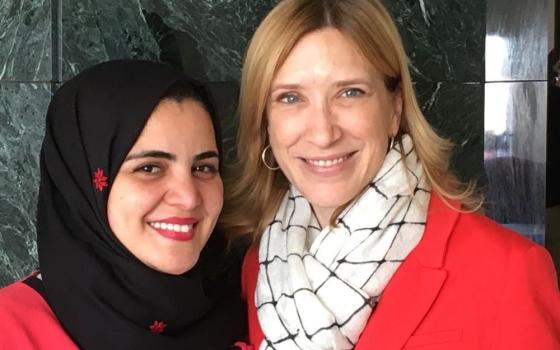
A portion of "The Conversion of St. Ignatius Loyola" by Miguel Cabrera (1695-1768). (Artvee)
"At least you got pregnant! What a blessing!"
As I digested these words from a well-meaning acquaintance, I wanted to spit them out immediately. I had just suffered a miscarriage, and in the midst of this deep, personal tragedy, I was being directed to consider the pregnancy, and the subsequent death of my child, as something good from God. At that moment, in the throes of grief, the thought made me shudder.
I certainly could not see my situation as a blessing or a gift in that moment. My child had died, my body was broken, and the future I'd imagined with my husband and my child had been erased. I desperately wanted the person in front of me to share in my overwhelming sadness, but instead I felt unseen — and like I had to put on a happy face.
At the time of my loss, I was working at a Jesuit retreat center, run by the order of priests founded by St. Ignatius Loyola, so I was familiar with Ignatius' most famous work, The Spiritual Exercises, and the practical path of prayer and discernment he created known as Ignatian spirituality. St. Ignatius, whose feast day is celebrated July 31, experienced a powerful conversion after a cannonball hit him during battle. As he recovered, he learned to pay attention to God at work in his life. The very practical nature of noticing and responding to God within normal life and within the parts of life that weren’t expected — like being struck down by a cannonball or hearing that your baby has no heartbeat — had appealed to me.
I was also familiar with cura personalis, an Ignatian term that means "care for the whole person," and it spoke to me deeply. I longed for all that I was to be held by God without me holding anything back. I longed for the people God put in my path to see my whole self — and for me to see their whole selves. Ignatian spirituality gave me the words and path to make that a reality.
Advertisement
The 500-year-old wisdom of the Spiritual Exercises starts with a prayer known as the "First Principle and Foundation." In laying out God's vision and purpose for our life, St. Ignatius begins with God’s love for us and our response to that love. In the modern translation by Jesuit Fr. David L. Fleming it begins
The goal of our life is to live with God forever. God, who loves us, gave us life. Our own response of love allows God's life to flow into us without limit.
This sentiment is echoed in the opening sentence of the Catechism of the Catholic Church: In a "plan of sheer goodness" God created us to share in God's blessings. Starting with God's goodness and love resonated with me, but also felt more intellectual than personal — especially after losing my child.
Sensing that human tendency to ask "How does this affect me?" St Ignatius goes on to say:
In everyday life, then, we must hold ourselves in balance before all of these created gifts … We should not fix our desires on health or sickness, wealth or poverty, success or failure, a long life or a short one. For everything has the potential of calling forth in us a deeper response to our life in God.
This is the part of the First Principle and Foundation where I heard a record scratching in my head. I certainly desired health instead of sickness, just as I deeply desired that my child had lived instead of died. Unfortunately, we cannot pretend that sickness, death, poverty or failure do not exist.
St. Ignatius is not asking us to ignore the reality of tragic events for the sake of focusing on only the good and happy things of this world, but rather his writing challenges us to bring both the joy and the tragedies to God. Ignatius invites us to trust that God is in all of it, caring about our entire reality and cura personalis, our whole selves.
I do not need to rejoice in every event of this life, but I can trust that I am not alone and God is with me in whatever I endure. During the intense grief of my miscarriage, God loved me fiercely and walked with me closely. And God walks with me still now as grief continues to rear its head. God is with each of us, walking with us no matter what we are facing in life. There will be tragedy, crisis and sin, but also goodness, beauty and abundance — and God will be in all of it. "Everything has potential of calling forth in us a deeper response to our life in God," Ignatius promises us.
Though it took time and kindness with myself to see it, there was blessing in my miscarriage. Not in the tragedy itself, but in how God showed up in it, reminding me in small and big ways that I was loved and not alone. But I am glad God didn't require me to instantly see my loss as a blessing and gift. God cared for my pain while gently inviting me to see blessings that were arising from this devastating loss.
The depth of my heartache was matched by the depth of God’s love and healing. Though my heart broke, it also broke open, increasing my capacity to be fully present with others in their pain. God's care and compassion for me invites me to offer the same care and compassion to others in their pain.
In my time of trial, God gave me new eyes to see complications and complexity without turning away, pretending it's less than it is, or trying to find a quick fix to solve it. God's accompaniment of me in my own suffering invites me to accompany others in theirs. It is through my broken-open, compassionate heart that God called me to use these gifts in service to God and others.
In the decade since my loss, God has invited me to walk with dozens of others who have lost a child. I have been the person someone turns to when the world as they knew it has stopped. I have talked softly with them through what's next and reminded them that God sees their pain and is with them in it. I would not be able to offer others this blessing had I not experienced God's care for me in my own time of loss.
The path of Ignatian Spirituality invites me to live and share all my life with God, trusting that God cares for my whole being and all that I am and having the privilege of sharing that truth with others as well. Because, it turns out, St. Ignatius was right: "Everything has the potential of calling forth in us a deeper response to our life in God."











